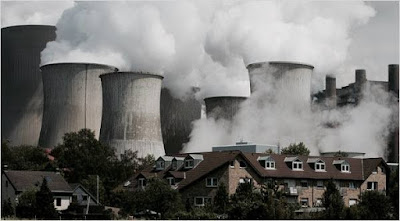Natural Gas vs. Coal, A Clear Choice (and the winner is...)
Gas is Cleaner
Natural gas is extremely abundant, and burns far cleaner than coal. With the recent advances in the drilling technology known as hydraulic fracturing (often called “fracking"), vast new resources of natural gas are being brought forth on practically a daily basis. How much cleaner is natural gas than coal? The difference is dramatic. According to the Worldwatch Institute, natural gas produces just over half the quantity of greenhouse gasses than coal, in general, over the course of the production and use of the energy source.
That figure includes taking a variety of factors into account, such as methane "flares and leaks” associated with natural gas extraction (which must be included in the assessment). Another advantage is that natural gas rigs tend to be less obtrusive within the environment when compared to strip mining and the large-scale terraced pits of major coal operations.
That figure includes taking a variety of factors into account, such as methane "flares and leaks” associated with natural gas extraction (which must be included in the assessment). Another advantage is that natural gas rigs tend to be less obtrusive within the environment when compared to strip mining and the large-scale terraced pits of major coal operations.
Big Greenhouse Gas Reductions
In the past five years, the United States has actually reduced its greenhouse gas emissions back to 1996 levels, or by more than 12%. Much of the credit has been attributed to a significant shift to natural gas to power major U.S. electrical utilities. Coal has fallen from supplying just more than 50% of U.S. total energy output to just below 35%, while natural gas increased from 15% in 2005 to around 35% by 2015. Because natural gas burns far cleaner than coal, this shift has undoubtedly been a factor in the reduction of carbon being pumped into the atmosphere.
Note that other factors have reduced the overall production of greenhouses gases as well. Examples are the increased use of renewable energy and energy efficiency technologies, as well as a flat economy in which industry was using less energy, people driving less in general; choosing sustainable mass transit options, car sharing, carpooling or biking. In addition, the use of more efficient cars has helped to reduce GHGs. Still, the reduction of coal usage and the increase of natural gas is a primary influence.
Note that other factors have reduced the overall production of greenhouses gases as well. Examples are the increased use of renewable energy and energy efficiency technologies, as well as a flat economy in which industry was using less energy, people driving less in general; choosing sustainable mass transit options, car sharing, carpooling or biking. In addition, the use of more efficient cars has helped to reduce GHGs. Still, the reduction of coal usage and the increase of natural gas is a primary influence.
Controversy
Of course, the boom in natural gas production has not been without controversy. The process of hydraulic fracturing has spawned widespread protest, especially from environmental groups, who say the process has not been proven to be safe. Fracking uses dangerous chemicals in the extraction process. Other factors also detract from the benefits of natural gas. For example, hydraulic fracturing requires large amounts of silica sand and enormous quantities of water to accomplish the task.
Many areas are being mined for sand, as well as the shale rock the fossil fuel is trapped in. As a result, many local citizens are alarmed about the numerous sandy pits that are opening gaping holes in once pristine landscapes as well as the damage caused near productive farmland given over to natural gas production. In addition, ground water has been polluted by methane leaks. In general, however, the advantages of natural gas over coal are significant across the board when all factors of economics, energy production and ecology are considered.
Many areas are being mined for sand, as well as the shale rock the fossil fuel is trapped in. As a result, many local citizens are alarmed about the numerous sandy pits that are opening gaping holes in once pristine landscapes as well as the damage caused near productive farmland given over to natural gas production. In addition, ground water has been polluted by methane leaks. In general, however, the advantages of natural gas over coal are significant across the board when all factors of economics, energy production and ecology are considered.
Green City Times is a resource on sustainability, urban planning, renewable energy, sustainable mass transportation, energy efficiency and green building. Find facts on renewable energy including: hydroelectric (from dams, mills, waves, currents and tides), solar, wind, geothermal, biomass (and biofuel). Also get info. about everything from recycling to clean coal…
You will discover information on 7 of the world’s most sustainable cities. Green City Times also features articles on the latest sustainability technology. Please feel free to contact us with any questions or comments.
For more on Green City Times, please see: https://about.me/gctimes



